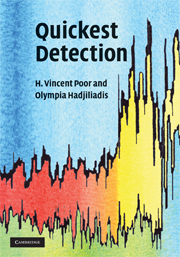4 - Sequential detection
Published online by Cambridge University Press: 06 July 2010
Summary
Introduction
This chapter will formulate and solve the classical sequential detection problem as an optimal stopping problem. This problem deals with the optimization of decision rules for deciding between two possible statistical models for an infinite, homogeneous sequence of random observations. The optimization is carried out by penalizing, in various ways, the probabilities of error and the average amount of time required to reach a decision. By optimizing separately over the error probabilities with the decision time fixed, this problem becomes an optimal stopping problem that can be treated using the methods of the preceding chapter. As this problem is treated in many sources, the primary motivation for including it here is that it serves as a prototype for developing the tools needed in the related problem of quickest detection.
With this in mind, both Bayesian and non–Bayesian, as well as discrete– and continuous–time formulations of this problem will be treated. In the course of this treatment, a set of analytical techniques will be developed that will be useful in the solution and performance analysis of problems of quickest detection to be treated in subsequent chapters. Specific topics to be included are Bayesian optimization, the Wald—Wolfowitz theorem, the fundamental identity of sequential analysis, Wald's approximations, diffusion approximations, and Poisson approximations.
Sequential testing displays certain advantages over fixed sample testing in that it helps the user reach a decision between two hypotheses after a minimal average number of experiments.
Information
- Type
- Chapter
- Information
- Quickest Detection , pp. 65 - 101Publisher: Cambridge University PressPrint publication year: 2008
